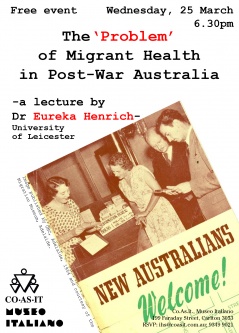The "Problem" of Migrant Health in Post-War Australia - lecture at Museo italiano by Dr Eureka Henrich (Leicester University)
- Date
- 25 March
06:30pm to 08:00pm
In the quarter century following the Second World War, Australia embarked upon an unprecedented immigration programme which encouraged 2.5 million people to move to the other side of the world. Assisted passage agreements were brokered with Britain, the Netherlands, Italy, West Germany, Austria, Greece, Turkey and Yugoslavia, as well as with the International Refugee Organisation, the latter facilitating the journeys of more than 170,000 refugees from Central and Eastern Europe. These migrants were intended to increase national security by bolstering the Australian population, and to provide the essential labour for an expanding economy. The Department of Information, together with the Department of Immigration orchestrated a publicity campaign to allay domestic concerns about the arrival of so many ‘Poms’ and ‘foreigners’. They emphasised the health and assimilability of these ‘New Australians’, portraying robust and friendly young workers keen to shake off their pasts and become fellow citizens. To attract migrants, an image of Australia as a ‘healthy haven’ was cultivated, with an emphasis on quality of life and an abundance of opportunities.
But while the public image of migrants as ‘splendid human material’ was promoted throughout the 1950s and 1960s, doubts began to be raised in political, academic and medical circles as to the fitness of the new arrivals, especially given the stress of migration and the pressure to rapidly assimilate. In particular, psychologists and general practitioners began to ask ‘Is migration bad for people’s health?’, ‘Who is to blame?’ and ‘What can be done about it?’ Drawing on an analysis of articles from medical journals of the period, this talk will examine how migrant health became constructed as a ‘problem’ in post-war Australia. It will consider the ways that medical professionals designed and implemented scientific studies, chose and narrated their case studies and characterised their migrant patients in their writings. By examining the frequent assumptions and opinions about national and cultural ‘types’ that can be found in this literature (as well as the occasional rebuttals that these opinions provoked), this talk aims to give fresh insights into how ideas about health were central to the post-war project of making ‘new Australians’.
Medical practitioners’ perspectives form only one aspect of the larger project of which this research is a part. Whilst in Australia Dr Henrich will be visiting museums, galleries, libraries and archives to investigate a range of sources that provide migrant and governmental perspectives on the connections between health, assimilation and identity. She is particularly interested in existing oral history collections, life writing and material culture, and would be happy to be contacted by interested organisations and members of the public by email at [email protected]
Dr Eureka Henrich
Eureka grew up in Sydney, where she pursued her twin loves of history and music with a combined Bachelor of Music/Bachelor of Arts (History Honours) degree at the University of New South Wales (UNSW). A brief stint working in museums in London solidified her interest in the ways that the past is represented in public, and she returned to Sydney in 2008 to start a PhD on Australia’s history of migration exhibitions. Her thesis, ‘Whose Stories are we Telling? Exhibitions of Migration History in Australian Museums, 1984 – 2001’, was awarded the UNSW Faculty of Arts and Social Sciences Best Doctoral Thesis Prize 2012, and she has since published a number of articles and book chapters based on the research. Eureka now lives in the UK where she holds a Wellcome Trust Research Fellowship in Medical Humanities at the University of Leicester. Her current research project, ‘Healthy Citizens? Migrant Identity and Constructions of Health in Post-War Australia’, examines the links between government policies of assimilation, migrants’ sense of self and changing popular and professional understandings of health in the period 1945-1970. Online, Eureka can be found writing and sharing ideas, articles and research on migration, immigration policy and the public uses of history on Twitter @DrEurekaHenrich, and on her blog, http://eurekahenrich.wordpress.com
Free event
Date: 25 March, 6.30pm
Venue: Museo Italiano, Co.As.It. 199 Faraday Street, Carlton 3053
RSVP : [email protected]; (03)9349 9021

